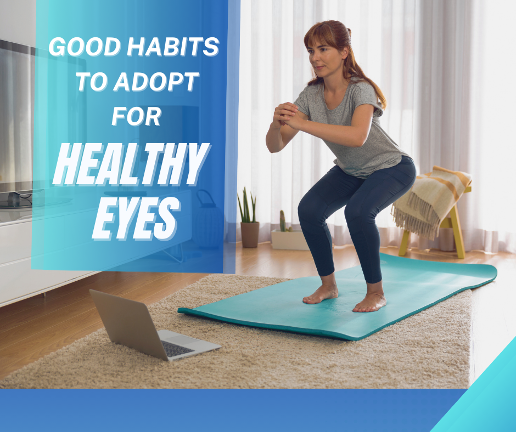Home » Blog » Good Habits to Adopt For Healthy Eyes
Good Habits to Adopt For Healthy Eyes
Posted by: Georgia Center for Sight

From the moment you wake up to the moment you close your eyes to sleep, your eyes play an essential role in your ability to navigate the world. As your body ages, so will your eyesight change. Some changes are driven by heredity, and the elements of our environment exacerbate others.
Without healthy eyes, your quality of life would likely change dramatically. Here’s the good news: developing these simple, easy-to-adopt eye-healthy habits can help protect your eye health. This simplicity should empower you and motivate you to take charge of your eye health.
Move Your Body
Thirty minutes of daily exercise benefit one’s heart, waistline, and energy level. Regular physical activity can also do the eyes a world of good! Many eye diseases are linked to other health problems, including high blood pressure, diabetes, and high cholesterol levels.
Wash Your Hands
Washing your hands for 20 seconds is a crucial habit to adopt for your overall health and vital for your eye health. According to the Centers for Disease Control and Prevention (CDC), many common vision-related diseases can be spread by touching in or around the eye with an unwashed hand. This is because the eyes are a direct entry point for germs and bacteria, and handwashing helps prevent these harmful agents from reaching your eyes.
Bacterial and viral infections can cause long-term eyesight damage. To reduce your risk, develop a healthy handwashing routine. Also, never touch near your eyes for any reason if you have not just washed your hands.
Wear Eye Protection
It only takes one time not wearing protective glasses for something to become lodged in your eye. Wear eye protection around projectile-flinging equipment every time. This can include safety goggles, face shields, or even a simple pair of sunglasses. Eye protection can also include wearing sunglasses with UVA and UVB protection, which help shield your eyes from harmful UV rays.
Eat A Nutritious Diet
A diet low in fat and rich in fruits, vegetables, and whole grains benefits the entire body, including the eyes. Studies show that foods rich in vitamins C and E, zinc, lutein, and zeaxanthin are good for eye health. These nutrients are linked to a lower risk for age-related macular degeneration (AMD) and dry eye later in life. Eye-healthy food choices include citrus fruits, vegetable oils, nuts, whole grains, dark green leafy vegetables, and cold-water fish.
Get A Good Night’s Sleep
Don’t short-change yourself by skimping on your sleep. Ensure you get enough sleeping Z’s to allow your eyes to rest, reducing strain and eye problems such as the dry eye. Sleep is crucial for your eyes to recover from the day’s strain and to maintain their health. Adults should aim to get seven to eight hours of sleep per night. Your eyes will thank you!
Quit Smoking
Avoiding smoking and second-hand smoke — or quitting, for current smokers — are some of the best investments everyone can make for long-term eye health. Smoking increases the risk of eye diseases like cataracts and age-related macular degeneration (AMD). Tobacco smoke, including second-hand smoke, also worsens dry eye.
Take Charge of Your Eye Health!
Don’t skip your eye exam—schedule it TODAY! We are here to help our patients identify issues early and advise them about lifestyle changes to keep their eyes healthy.
You only get one set of eyes. Please keep them in tip-top shape!

